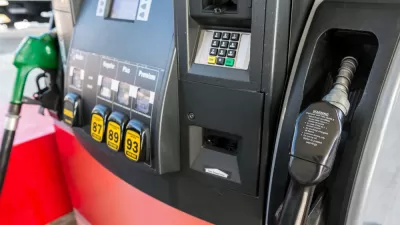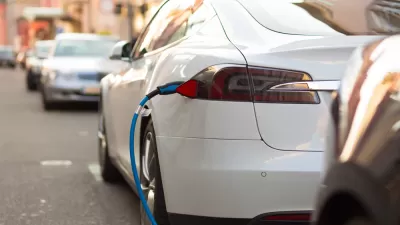Ben Adler of Grist writes how falling oil prices will affect climate change. Cheaper gas prices may encourage more driving and more truck sales at the expense of hybrid, electric, and fuel efficient cars, but the news may not be all bad.
The media has mostly written about the economic benefit brought by falling gas prices. "It is estimated that for every one cent decline in gasoline prices (sustained over one year), $1.4 billion is added to the economy," writes The Hill contributor, David Russell, Jr.
But Adler reminds us of two considerable environmental downsides: "(M)ore gasoline burning and less investment in cleaner alternatives and technologies" which will increase greenhouse gas emissions.
Low oil prices reduce the financial incentives to use less oil or switch away from it. That could slow or even reverse the current trend of declining emissions caused by reduced driving and more fuel-efficient cars.
Falling gas prices do not bode well for President Obama's rigorous fuel efficiency standard of "54.5 mpg by 2025 standard" that contributed to U.S. gasoline consumption peaking in 2004.
American automakers don’t improve efficiency unless they’re forced to. Drivers in the U.S. have prized other features, like size and speed, over fuel economy, and the auto industry has shortsightedly fed their gluttonous appetites.
Even before the precipitous drop in oil prices, hybrid sales were falling, and the auto market began shifting from an emphasis on fuel economy to performance as Michael Sivak's research from the University of Michigan indicated. EPA will conduct a mid-term review of the standard in 2017, and gasoline prices south of $3 per gallon may not bode well to retain it.
While the media has indicated that the reason why Saudi Arabia has not cut its production (to keep prices higher) is to retain market share, Adler speculates a more sinister reason: "(T)hey may benefit more in the long run from keeping prices low enough that we do not free ourselves from oil dependence."
The one up-side to falling oil prices may be that some of the dirtier, more carbon intensive forms of oil, such as tar sands, or energy-intensive forms or extraction, such as fracking, may initially no longer be economical due to higher extraction costs.
Deborah Gordon, director of the Energy and Climate Program at the Carnegie Endowment for International Peace describes the "four categories of crudes that pose the biggest climate gamble" for The Hill.
FULL STORY: Will falling gas prices be bad for the climate?

Alabama: Trump Terminates Settlements for Black Communities Harmed By Raw Sewage
Trump deemed the landmark civil rights agreement “illegal DEI and environmental justice policy.”

Study: Maui’s Plan to Convert Vacation Rentals to Long-Term Housing Could Cause Nearly $1 Billion Economic Loss
The plan would reduce visitor accommodation by 25% resulting in 1,900 jobs lost.

Why Should We Subsidize Public Transportation?
Many public transit agencies face financial stress due to rising costs, declining fare revenue, and declining subsidies. Transit advocates must provide a strong business case for increasing public transit funding.

Paris Bike Boom Leads to Steep Drop in Air Pollution
The French city’s air quality has improved dramatically in the past 20 years, coinciding with a growth in cycling.

Why Housing Costs More to Build in California Than in Texas
Hard costs like labor and materials combined with ‘soft’ costs such as permitting make building in the San Francisco Bay Area almost three times as costly as in Texas cities.

San Diego County Sees a Rise in Urban Coyotes
San Diego County experiences a rise in urban coyotes, as sightings become prevalent throughout its urban neighbourhoods and surrounding areas.
Urban Design for Planners 1: Software Tools
This six-course series explores essential urban design concepts using open source software and equips planners with the tools they need to participate fully in the urban design process.
Planning for Universal Design
Learn the tools for implementing Universal Design in planning regulations.
Smith Gee Studio
Alamo Area Metropolitan Planning Organization
City of Santa Clarita
Institute for Housing and Urban Development Studies (IHS)
City of Grandview
Harvard GSD Executive Education
Toledo-Lucas County Plan Commissions
Salt Lake City
NYU Wagner Graduate School of Public Service




























